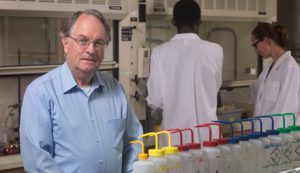 The 2019 Nobel Prize in Chemistry has been awarded to M. Stanley Whittingham, distinguished professor of chemistry and materials science at Binghamton University.
The 2019 Nobel Prize in Chemistry has been awarded to M. Stanley Whittingham, distinguished professor of chemistry and materials science at Binghamton University.
Whittingham won the prize for pioneering research leading to the development of the lithium-ion battery along with John B. Goodenough, Virginia H. Cockrell Centennial Chair in Engineering at the University of Texas at Austin, and Akira Yoshino of Meijo University in Japan.
“I am overcome with gratitude at receiving this award, and I honestly have so many people to thank I don’t know where to begin,” Whittingham says. “The research I have been involved with for over 30 years has helped advance how we store and use energy at a foundational level, and it is my hope that this recognition will help to shine a much-needed light on the nation’s energy future.”
Whittingham came to Binghamton University in 1988 after 16 years at Exxon Research and Engineering Company, where he received the patent for a rechargeable lithium-ion battery, and Schlumberger-Doll Research. In his 30-plus year career, he has been a pioneer in the development of lithium-ion batteries. He holds the original patent on the concept of the use of intercalation chemistry in high-power density, highly reversible lithium batteries — work that provided the basis for subsequent discoveries that now power most laptop computers.
With more than 200 publications in some of the leading scholarly journals and 16 patents, Whittingham has earned a national and international reputation as a prolific scientist. His research in the area of synthesis and characterization of novel transition metal oxides for energy storage and conversion, separations or as sensors has been continuously supported since his arrival in Binghamton, with over $7 million in federal research grants from the National Science Foundation and the Department of Energy.
Whittingham also helped to establish Binghamton’s Materials Science and Engineering Program, bringing his creativity and innovation to the University’s graduate curriculum as well as to its laboratories.
Whittingham and his research group emphasize novel approaches to synthesis at ambient temperature, which often allows structures to be formed that are unstable under the high temperatures normally used for preparing oxides. He serves as director of the NorthEast Center for Chemical Energy Storage, an Energy Frontier Research Center that’s also part of Binghamton’s New York State Center of Excellence.
“Binghamton is very proud that the Nobel committee has chosen to award Distinguished Professor of Chemistry M. Stanley Whittingham with the Nobel Prize for his pioneering work on lithium-ion batteries,” University President Harvey Stenger says. “Professor Whittingham’s work has fundamentally changed the way the world stores and utilizes energy, making possible a revolution in consumer and industrial technologies. For nearly 30 years, Professor Whittingham has been one of the most visible and productive researchers at the University, and all of us at Binghamton congratulate him on this great honor.”
Whittingham has been recognized by his peers with two major awards in recent years. In 2002, he received the Battery Research Award of the Electrochemical Society for his many contributions to “Intercalation Chemistry and Battery Materials,” and two years later he was elected a Fellow of the Electrochemical Society.
He has also participated and held leadership positions in the American Chemical Society, the American Physical Society, the Electrochemical Society and the Materials Research Society; and served on the editorial boards of several journals, including Chemistry of Materials and the Materials Research Bulletin. He was also the founder and principal editor of the journal Solid State Ionics — one of the two major journals in the field.
Whittingham earned his bachelor’s, master’s and doctoral degrees from Oxford University before coming to the United States as a post-doctoral fellow at Stanford University.
He is the State University of New York’s 16th Nobel laureate.
Coverage of this exciting story:
Forbes on the science behind this year’s chemistry prize
The Washington Post on Whittingham and his fellow award-winners
The New York Times on the sequence of events that led to the battery breakthrough







